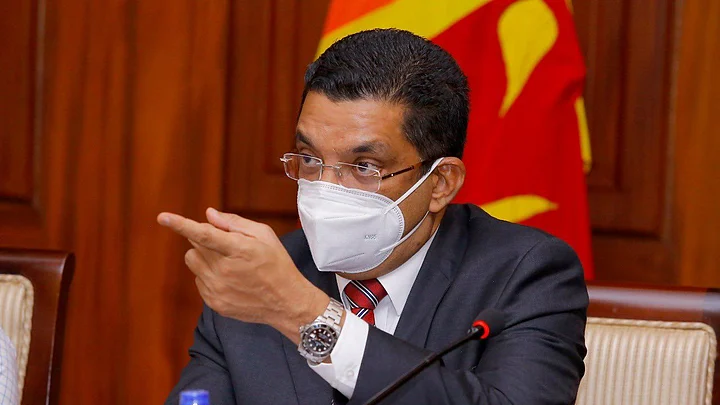Ali Sabry, who replaced President Gotabaya Rajapaksa's brother Basil Rajapaksa as Sri Lanka's finance minister on Monday, 4 April, resigned on Tuesday after just one day in the Cabinet.
On Monday, Sabry joined the new Cabinet, along with Dinesh Gunawardena, Leader of the House, who was appointed education minister, while Chief Government Whip Johnston Fernando was named highways minister. GL Peiris was once again appointed as the foreign affairs minister.
"After much reflection and deliberation, and taking into consideration the current situation I'm now of the view, for your Excellency to make suitable interim arrangement to navigate this unprecedented crisis... including the appointment of a new finance minster," he wrote to President Rajapaksa in a letter.
"When I tendered my resignation from the post of Minister of Justice on the 3rd of April 2022, it was not my intention to take up any post thereafter. However, in order to maintain parliamentary democracy and the stability of the system... I decided to accept the post of Minister of Finance only as an interim measure."Ali Sabry
"Whilst I regret the inconvenience caused, I believe I have always acted in the best interests of the country," Sabry further stated, adding that "fresh and proactive and unconventional steps" were needed to solve the country's problems.
Sri Lanka Cabinet Resigns En Masse
All four ministers – Sabry, Gunawardena, Fernando, Peiris – were sworn in at the Presidential Secretariat on Monday, hours after the previous Cabinet resigned en masse.
Weighing in on Sabry's appointment, M Sathiya Moorthy, head of the Observer Research Foundation’s (ORF's) Chennai Initiative, said:
"Some of the Rajapaksas may have to quit to give people the impression that it’s not going to be a family-ruled government as it used to be. But the new Finance Minister Sabry is basically a senior lawyer. His only qualification is that he was Gotabaya's lawyer when he was charged with corruption earlier in 2016 and his two-plus years as Justice Minister."
The PM's son, Namal Rajapaksa, had also resigned from the post of the Cabinet minister of youth and sports on Sunday along with other ministers.
Following suit on Monday, Ajith Nivard Cabraal, Governor of Sri Lanka's Central Bank (CBSL), also submitted his resignation to the president.
Later, former CBSL official P Nandalal Weerasinghe accepted an offer from Rajapaksa to become the central bank's next governor.
Abolish Executive Presidency: Opposition Leader in Fiery Speech
Making a fiery speech in the Parliament on Tuesday, 5 April, Opposition leader Sajith Premadasa called for the abolition of the all-powerful executive presidency within a week. He also stressed that the Parliament must be strengthened, while ensuring that a similar dictatorial premiership does not come back. The country's president Rajapaksa and the entire government must resign, he said as per Economynext.
Earlier in the day, the ruling coalition lost its majority in Parliament after 41 lawmakers walked out of the alliance amidst the economic crisis.
“The time has come to change the executive presidency. Let us use this opportunity,” he said, even as MPs of his party applauded.
Instead of revoking the the 20th amendment, he said that the entire executive presidency should be abolished.
The previous 19th amendment was passed under President Maithripala Siresena when the Yahapalana government was ruling. The 20th amendment restored powers taken away by the 19th amendment from the presidency. On Tuesday, Siresena had called for the reinstatement of the 19th amendment with further amends.
Opposition Rejects President’s 'Unity Govt' Offer
On Monday, the Sri Lankan president had invited all political parties in the country to join a 'unity government' to find a solution as the nation sees increasing protests amidst a severe economic and political crisis.
A press release from the president's media division said that the current crisis is due to several economic and global factors and that as a leading democracy in Asia, Sri Lanka should address the issue within the framework of democracy itself.
Accordingly, the Sri Lankan President had invited all political parties representatives in Parliament to take up ministerial posts and work together.
However, Sri Lanka's opposition parties on Monday dismissed President Gotabaya Rajapaksa's invitation to join the unity government as "nonsensical" and as a "sham", and rather demanded his resignation over the country's worsening shortages of food, fuel, and medicines.
Nationwide Protests
Meanwhile, thousands of Sri Lankans marched in the rain on Tuesday, despite repeated warnings by the police, protesting against the food and fuel shortages. Protests have intensified in the past week as the government extended nationwide power shortages to 15 hours daily after running dangerously low on electricity.
Sri Lanka also announced the temporary closure of its embassies in Oslo and Baghdad, and the consulate general in Sydney, due to lack of funds, from 30 April.
(At The Quint, we question everything. Play an active role in shaping our journalism by becoming a member today.)
